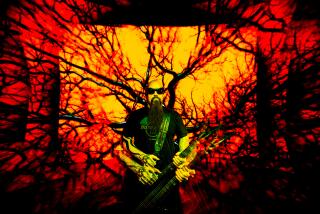Three Rubin Discoveries
Slayer is the biggest selling and most controversial of Rubin’s Def American bands. One of the first speed-metal bands to emerge in the early ‘80s, its lyrics are often gore-filled and also touch on Satanism and Nazism in ways that provoke horror and disgust. All this suits the L.A.-based group just fine: The aim is to shock.
While parents cringe at song titles such as “Spill the Blood” and “Necrophiliac,” most Slayer fanatics view them the same way they do the latest gruesomely entertaining and amusing Freddie Krueger flick. Similarly, such songs as “South of Heaven” and “Crooked Cross” aren’t odes to Satan and Hitler, but, according to the band, are sarcastic views of devil and Nazi worshipers.
However, lyrics are not as important to Slayer’s teen male fans as the group’s high-speed guitar riffs and explosive drumming. Even with the slower musical pace of several songs in last year’s “South of Heaven” album, the group’s music is jolting.
Masters of Reality lead singer Chris Goss describes the band’s home base of Syracuse as “a failing industrial town with very conservative radio.” It’s easy to see how someone as strikingly independent as Goss and guitarist Tim Harrington were seen as so out of step when they started playing clubs together in the early ‘80s as just a duo backed by taped rhythm tracks.
The Masters plugged away for years with ever-changing lineups and configurations--acoustic, with or without keyboards and eventually a live rhythm section--before coming under Rubin’s wing in 1987. “Before we hooked up with Rick, it was more of a blurry, college-radio, psychedelic kind of sound,” says Goss. “But he brought everything up front, really crunchy, and clarified everything--took our essence.
“What’s important to Rick is creating music that moves. . . . Kraftwerk and Black Sabbath did the same thing. You go with it, you ride it. And Black Sabbath’s like a snow plow, maybe, and Kraftwerk’s like a spaceship--but then you take off.”
There’s an often unsettling view of the world presented in the brutal rhythms and pagan references in Danzig’s music. Many of leader Glenn Danzig’s songs are based on his readings conclusions drawn from the “lost chapters” of the Bible, which some believe were removed in the early days of Christianity. “Twist of Cain,” he explains, is “basically about Satan fathering Cain in the original Bible. Satan fathered Cain to perform the first act of murder in history.”
Danzig fronted the Misfits, a punk band in the early ‘80s that also stood out on the fringes of its musical scene. However, the Misfits’ horror-flick lyrics and speed-demon beat were nowhere near as penetrating as the ideas the singer now explores.
Though other record labels were interested in Danzig, he signed with Rubin because he felt the record producer would best tolerate his musical vision. He says, “Rick wasn’t like some record company president who was just a moron, some PR guy.”
More to Read
The biggest entertainment stories
Get our big stories about Hollywood, film, television, music, arts, culture and more right in your inbox as soon as they publish.
You may occasionally receive promotional content from the Los Angeles Times.










